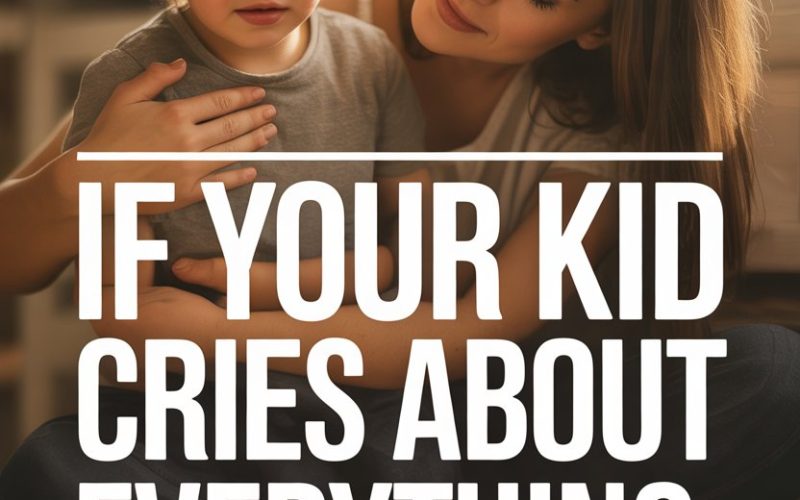Short sleeves or long? Toast cut in triangles or squares? Someone dared to look at them?
If your home echoes with the dulcet shrieks of a child in full meltdown over things that would barely register on the adult emotional Richter scale, you’re not alone.
Welcome to the club—please wipe your feet and keep your voice down; someone’s always mid-sob.
Let’s cut through the noise—and maybe the tears—together.
Big Feelings in Small Packages
Children are pint-sized emotional powerhouses. Their brains are still under construction, especially the parts that handle impulse control, logic, and emotional regulation.
Turns out, that’s not just an excuse for why your four-year-old is currently outraged that her socks “feel weird.” It’s science.
The prefrontal cortex, which helps us manage and make sense of our feelings, isn’t fully developed until the mid-20s, according to this child development research.
Add in hunger, tiredness, or a case of the Mondays, and you’ve got a recipe for tears over just about anything.
Why the Waterworks Happen
The reasons for frequent crying are as varied as the reasons adults swear under their breath.
Some kids have sensitive temperaments; others are overwhelmed by sensory input; a few may be anxious or prone to perfectionism (hello, future list-makers).
Sometimes, the real reason is so buried under layers of frustration or exhaustion that not even your seasoned-parent detective skills can dig it up.
You may find yourself facing a child who dissolves into tears over the wrong-coloured cup, the injustice of bedtime, or because you dared to tie their shoelaces after they asked for help.
It’s exasperating, endearing (on a good day), and absolutely normal.
What’s Normal and When to Worry
Every child cries. Some just have… more dramatic leanings.
Emotional outbursts are common between ages two and six, but even older kids can struggle with managing big feelings.
If tears seem relentless and come with signs like withdrawal, sleep problems, or changes in appetite, it’s worth chatting with your GP or a child psychologist.
Persistent, unexplained crying sometimes signals underlying issues, such as anxiety or sensory processing differences. The NHS has useful guidance for parents wondering when it might be time for more support.
Barring any red flags, most little ones simply need help learning the ropes of emotional management.
How to Respond When Tears Start Flowing
You know the drill: The wailing starts, and you want to fix it—pronto. Resist the urge to leap straight into problem-solving mode or issuing ultimatums like “Stop crying or…” Instead, try these approaches:
Stay Calm and Channel Your Inner Statue
Children feed off our emotions.
If you react with frustration or panic, the situation often escalates. Take a deep breath—count to ten, recite the alphabet backwards, do whatever stops you from joining the chorus of wailing.
By keeping your cool, you show your child that upset feelings are manageable and safe.
Easier said than done? Absolutely. Worth practising anyway? 100 percent.
Acknowledge the Feeling, Not the Drama
Imagine sobbing to a mate about a rough day only to be told, “Stop crying. It’s not a big deal.” Not exactly comforting, right?
Try validating your child’s feelings. Phrases like “I see you’re upset because your banana broke,” or “It sounds like you’re really disappointed we can’t go to the park” go a long way.
This doesn’t mean you agree that life is unlivable without triangle-shaped toast, but it does show you care.
Studies show that emotion-coaching parents raise children who are better at handling stress. It starts with simple acknowledgment.
Offer Comfort Without Overdoing It
A hug, a gentle pat, or just sitting nearby quietly can work wonders. For some children, physical closeness is soothing; others prefer a bit of space.
Respect your child’s preferences without making a grand production of it—sometimes minimal fuss is the best medicine.
If your child wants to be left alone, let them know you’re nearby when they’re ready. The offer of comfort is sometimes as powerful as the comfort itself.
Give Feelings Names
Little ones often cry because they lack the words for what they feel. Help them label emotions: “You seem angry,” or “I think you’re frustrated.”
Over time, this builds their emotional vocabulary and makes feelings less overwhelming (for both of you).
Books like The Colour Monster can help turn complex emotions into more manageable ideas. Plus, they’re a lovely excuse for a cuddle on the sofa.
Problem-Solve When the Storm Passes
While your child is mid-meltdown, rational thought is off the table. Wait until calm returns before gently brainstorming how things might go differently next time.
Ask questions like, “What could we do if your favourite cup is in the dishwasher?” or “How can we help you feel less upset at bedtime?”
Encourage your child to be part of the solution—not just a recipient of it. Even small children enjoy feeling involved.
Pick Your Battles, Surrender with Grace
Some tears, frankly, don’t matter in the grand scheme. If your child is sobbing because their socks are ever-so-slightly bunched and you’re not running late, it’s okay to swap them out.
If they want to wear mismatched shoes to Tesco, let them set the new village trend.
Not everything warrants a power struggle, and sometimes a swift surrender is an act of parenting genius, not defeat.
Set Gentle Limits When Needed
Tears don’t mean you have to cave on every boundary. It’s possible to show empathy while holding the line: “I know you’re upset, but we still need to brush your teeth before bed.”
Consistency, wrapped in warmth, helps kids feel safe—even when they don’t get their way. Boundaries are comforting, even if met with Oscar-worthy displays of distress.
Take Care of Yourself, Too
Listening to non-stop crying would test the patience of a saint. There’s no shame if you need to close the bathroom door for two minutes, text a mate, or make a quick call to your mum for a pep talk.
Parenting is relentless, and your mental health matters at least as much as your child’s.
Consider swapping childcare with another parent for a breather, or try apps like Headspace for bite-sized mindfulness sessions—yes, even five minutes count.
When Sibling and Peer Tensions Fuel the Tears
If your child dissolves into tears any time their sibling looks at them funny (or, heaven forbid, breathes the same air), try setting up “special time” with each child separately.
Even ten minutes of one-on-one attention can soothe bruised egos and dial down the drama.
For kids who are sensitive to playground politics, role-playing tricky scenarios or reading books about friendship can build resilience. The book Enemy Pie is a perennial favourite for helping kids navigate social squabbles.
When It’s Not Just a Phase
Sometimes, relentless crying might point to something bigger.
If your child’s tears disrupt daily life, friendships, or learning, or if you’ve tried every trick in the book and nothing helps, reaching out to a professional is a proactive, caring move.
Your GP, school counsellor, or a local parenting support charity are great places to start.
There’s strength (and serious wisdom) in knowing when to ask for help.
What to Say When Other Adults Judge
That stranger in the supermarket with the raised eyebrows? The relative with the unsolicited advice about “toughening up”? Feel free to nod politely and carry on.
Every child is wired differently, and the world could use a bit more gentleness.
If you want a ready-made response, try: “She’s learning to handle her feelings right now, thanks for your patience.” Or, if you’re feeling cheeky: “He’s just auditioning for the school play—how’s he doing?”
Finding the Silver Lining in the Deluge
Children who cry often are frequently highly sensitive, empathetic, and insightful. Their big feelings, while exhausting now, can grow into emotional intelligence, compassion, and creativity.
Your child’s tears are not a sign you’re failing at parenting. They’re a sign you’re raising a human being who feels things deeply. With your support, those intense emotions will become strengths.
A Little Less Drama, A Lot More Connection
Not every day will be a tear-free masterpiece. Messy, noisy, emotional days are a hallmark of raising kids who care.
Next time your child cries over the “wrong” spoon, remember: this is not a referendum on your parenting skills. It’s a stage, a sign of growth, and sometimes, just a Tuesday.
Offer comfort, add a dash of humour, and keep the tissues handy.
You’ll both get through it—possibly with a few good stories for when they’re older and claiming they never cried at all.




